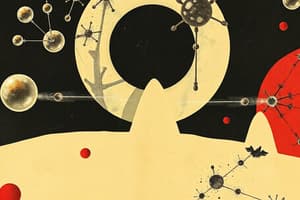Podcast
Questions and Answers
Dipole-dipole forces occur between the partially positive end of one polar molecule and the partially ______ end of another.
Dipole-dipole forces occur between the partially positive end of one polar molecule and the partially ______ end of another.
negative
CO exhibits dipole-dipole forces, which are stronger than ______ forces.
CO exhibits dipole-dipole forces, which are stronger than ______ forces.
dispersion
All molecules develop temporary instantaneous ______ as they are in constant motion.
All molecules develop temporary instantaneous ______ as they are in constant motion.
dipoles
Hydrogen bonding occurs when a hydrogen atom is bonded to one of the most electronegative elements: F, O, or ______.
Hydrogen bonding occurs when a hydrogen atom is bonded to one of the most electronegative elements: F, O, or ______.
N₂ is ______, so it does not exhibit dipole-dipole forces.
N₂ is ______, so it does not exhibit dipole-dipole forces.
Flashcards
Dipole-Dipole Forces
Dipole-Dipole Forces
An electrostatic force between the positive end of one polar molecule and the negative end of another.
Dispersion Forces
Dispersion Forces
Weak forces present in all molecules due to temporary, fluctuating dipoles.
Hydrogen Bonding
Hydrogen Bonding
Strong dipole-dipole interaction involving hydrogen bonded to a highly electronegative atom (F, O, or N).
Which molecule has a higher boiling point: N₂ or CO?
Which molecule has a higher boiling point: N₂ or CO?
Signup and view all the flashcards
Why are dispersion forces present in all phases of matter?
Why are dispersion forces present in all phases of matter?
Signup and view all the flashcards
Study Notes
Intermolecular Forces
- Dipole-Dipole Forces: Electrostatic force between the partially positive end of one polar molecule and the partially negative end of another. Examples include N₂ and CO.
- N₂ is nonpolar, therefore it does not exhibit dipole-dipole forces. Instead, it experiences dispersion forces.
- CO is polar, exhibiting dipole-dipole forces and stronger dispersion forces than N₂. Thus, CO has a higher boiling point (BP) than N₂.
Dispersion Forces
- Present in all condensed phases.
- Constant motion of electrons creates temporary instantaneous dipoles.
- These dipoles distort the electrons of neighbouring atoms, creating induced dipoles.
- The fluctuating temporary dipoles result in weak electrostatic attractions (dipole-dipole).
- Stronger with larger molecules/atoms due to more electrons and greater electron cloud polarizability.
Hydrogen Bonding
- Strong dipole-dipole bond.
- Occurs when a molecule contains a hydrogen atom bonded to a highly electronegative element (F, O, N).
- The hydrogen atom has a partial positive charge, and the electronegative atom has a partial negative charge, allowing for strong electrostatic attraction.
Studying That Suits You
Use AI to generate personalized quizzes and flashcards to suit your learning preferences.




